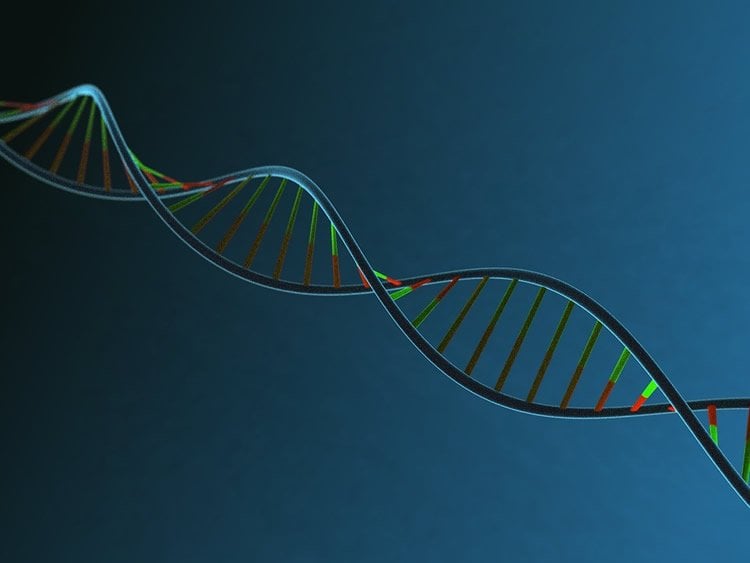Summary: University of Edinburgh researchers have discovered a ‘timetable’ for brain aging. They report most of the changes in gene expression were complete by middle age and female brains appear to age at a slower rate than male brains. Researchers note the biggest reorganization of genes occurs around the age of 26.
Source: University of Edinburgh.
The programme controls how and when brain genes are expressed at different times in a person’s life to perform a range of functions, the study found.
Experts say the timing is so precise that they can tell the age of a person by looking at the genes that are expressed in a sample of brain tissue.
Scientists analysed existing data which measured gene expression in brain tissue samples from across the human lifespan – from development in the womb up to 78 years of age.
They found the timing of when different genes are expressed follows a strict pattern across the lifespan.
Most of the changes in gene expression in the brain were completed by middle-age, the study found.
The gene programme is delayed slightly in women compared with men, suggesting that the female brain ages more slowly than the male.
The biggest reorganisation of genes occurs during young adulthood, peaking around age 26, the team found. These changes affected the same genes that are associated with schizophrenia.
The team says this could explain why people with schizophrenia do not show symptoms until young adulthood, even though the genetic changes responsible for the condition are present from birth.
The study found the genetic programme is present in mice too, although it changes more rapidly across their shorter lifespan. This suggests that the calendar of brain aging is shared between all mammals and may be millions of years old.

Researchers next plan to study how the genetic programme is controlled, which could lead to therapies that alter the course of brain aging, the scientists say.
It could also hold clues to new treatments for schizophrenia and other mental health problems in young adults.
Professor Seth Grant, Head of the Genes to Cognition Laboratory at the University of Edinburgh, said: “The discovery of this genetic programme opens up a completely new way to understand behaviour and brain diseases throughout life.”
Dr Nathan Skene, Research Scientist at the University of Edinburgh’s Centre for Clinical Brain Sciences, said: “Many people believe our brain simply wears out as we age. But our study suggests that brain aging is strictly controlled by our genes.”
Funding: The research, published in the journal eLife, was funded by the Medical Research Council, Wellcome Trust and the European Union Seventh Framework Programme.
Source: Jen Middleton – University of Edinburgh
Image Source: NeuroscienceNews.com image is in the public domain.
Original Research: Full open access research for “A genomic lifespan program that reorganises the young adult brain is targeted in schizophrenia” by Nathan G Skene, Marcia Roy, and Seth GN Grant in eLife. Published online September 12 2017 doi:10.7554/eLife.17915
[cbtabs][cbtab title=”MLA”]University of Edinburgh “Genetic Timetable of Brain’s Aging Process Discovered.” NeuroscienceNews. NeuroscienceNews, 12 September 2017.
<https://neurosciencenews.com/brain-aging-timetable-7467/>.[/cbtab][cbtab title=”APA”]University of Edinburgh (2017, September 12). Genetic Timetable of Brain’s Aging Process Discovered. NeuroscienceNews. Retrieved September 12, 2017 from https://neurosciencenews.com/brain-aging-timetable-7467/[/cbtab][cbtab title=”Chicago”]University of Edinburgh “Genetic Timetable of Brain’s Aging Process Discovered.” https://neurosciencenews.com/brain-aging-timetable-7467/ (accessed September 12, 2017).[/cbtab][/cbtabs]
Abstract
A genomic lifespan program that reorganises the young adult brain is targeted in schizophrenia
The genetic mechanisms regulating the brain and behaviour across the lifespan are poorly understood. We found that lifespan transcriptome trajectories describe a calendar of gene regulatory events in the brain of humans and mice. Transcriptome trajectories defined a sequence of gene expression changes in neuronal, glial and endothelial cell-types, which enabled prediction of age from tissue samples. A major lifespan landmark was the peak change in trajectories occurring in humans at 26 years and in mice at 5 months of age. This species-conserved peak was delayed in females and marked a reorganization of expression of synaptic and schizophrenia-susceptibility genes. The lifespan calendar predicted the characteristic age of onset in young adults and sex differences in schizophrenia. We propose a genomic program generates a lifespan calendar of gene regulation that times age-dependent molecular organization of the brain and mutations that interrupt the program in young adults cause schizophrenia.
“A genomic lifespan program that reorganises the young adult brain is targeted in schizophrenia” by Nathan G Skene, Marcia Roy, and Seth GN Grant in eLife. Published online September 12 2017 doi:10.7554/eLife.17915






